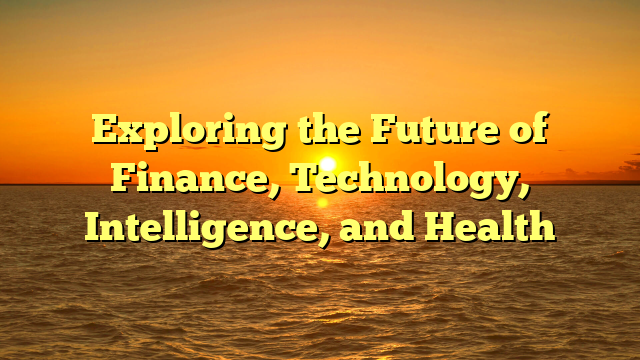—
Introduction
The rapid development of fields like finance, technology, intelligence, and health is revolutionizing the way we live. These fields are not isolated; they overlap and influence each other, creating a dynamic environment of opportunities and challenges. In this article, we explore how these domains interact and the future possibilities they present.
—
Finance: The Evolving Landscape
Finance has always been an essential aspect of human life, but with the rise of digitalization, its landscape is changing rapidly.
One of the most notable changes in finance is the rise of cryptocurrencies. Cryptocurrencies, such as Bitcoin and Ethereum, have disrupted traditional financial systems by providing decentralized, borderless alternatives to traditional banking. However, the rise of cryptocurrencies presents both opportunities and challenges for investors, policymakers, and regulators.
Another significant development in finance is the growth of fintech companies. These companies use technology to streamline banking, payments, lending, and investment services. With the integration of AI and machine learning, fintech firms can offer tailored financial products that meet the specific needs of consumers.
—
Technology: Driving Innovation Across Sectors
The role of technology in shaping our world cannot be overstated; it is a key driver of progress in many industries. From automation to artificial intelligence, technology is enabling solutions that were once thought impossible.
Artificial intelligence is transforming industries, from manufacturing to healthcare, by providing innovative solutions to complex problems. AI-driven tools and algorithms are increasingly being used to make better decisions, automate repetitive tasks, and improve the overall user experience.
In the healthcare sector, AI is playing a pivotal role in diagnosing diseases, predicting patient outcomes, and improving the quality of care. Additionally, technological advancements such as telemedicine and wearable health devices have made healthcare more accessible and efficient.
—
Intelligence: Human and Artificial
The development of artificial intelligence is reshaping the way we understand and apply intelligence in various fields. While human intelligence is characterized by creativity, problem-solving, and emotional intelligence, artificial intelligence mimics some of these abilities, creating a new form of computational intelligence.
In spb4 , AI has made significant strides in mimicking human cognition. Deep learning technologies are allowing computers to process and analyze large datasets, enabling them to perform tasks that were once the domain of humans.
As AI becomes more integrated into society, concerns about its potential to replace jobs and affect privacy are growing. These challenges need to be addressed through ethical guidelines, regulations, and continuous human involvement in decision-making.
—
Health: A Focus on Well-being
The health sector is undergoing a significant transformation due to technological advancements and a greater focus on overall well-being.
One of the key trends in healthcare is the move toward personalized medicine. With genomics, healthcare providers can tailor treatments to the unique genetic profiles of individuals, resulting in more effective care.
Preventative care is gaining traction, with an increasing focus on lifestyle changes to improve long-term health outcomes. Smart devices and health trackers are allowing individuals to monitor their health data and make informed decisions about their lifestyle.
—
Conclusion
The convergence of finance, technology, intelligence, and health is creating new opportunities for innovation and progress. However, as these advancements continue, it is important to consider the ethical implications and ensure that they are used for the greater good of society.
The evolution of finance, technology, intelligence, and health will play a critical role in shaping a sustainable and prosperous future.
